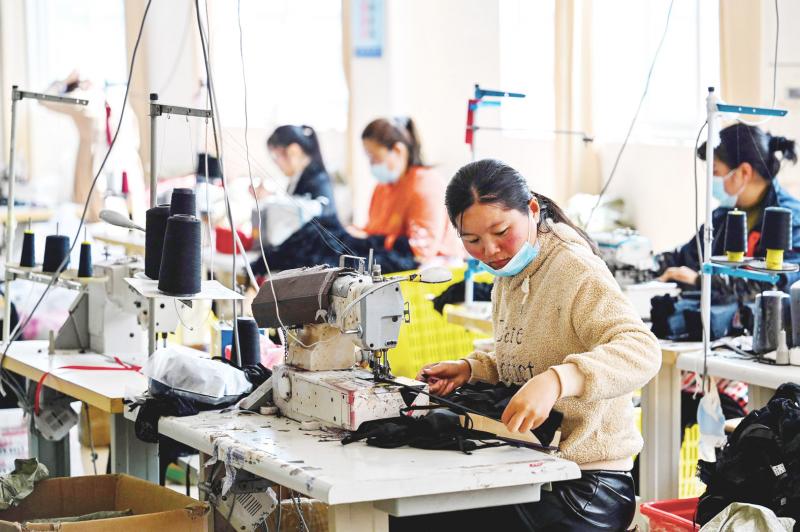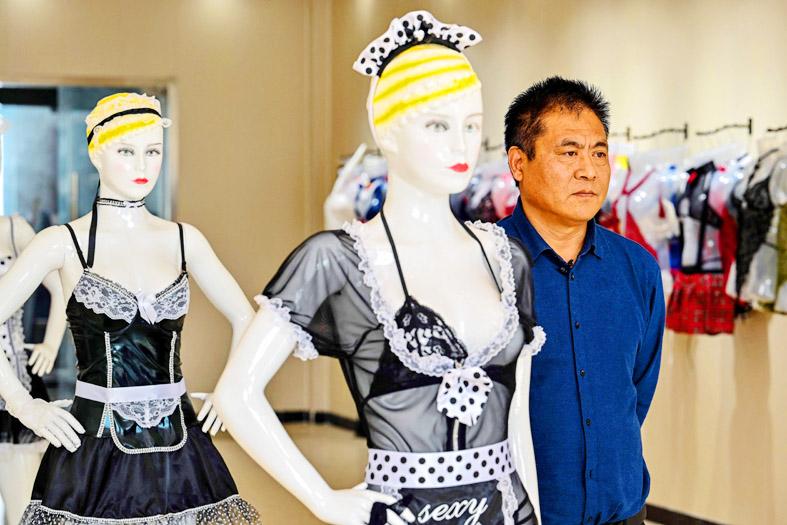Americans like their lingerie to be risque, Europeans prefer it classier, and Chinese remain a bit shy, but are opening up — but the biggest order of all came from North Korea.
So goes the street-corner discussion in Guanyun, a coastal county that for generations followed the rhythms of wheat and rice cultivation, but today concerns itself with global lingerie preferences.
The flat farming region between Beijing and Shanghai is China’s self-proclaimed “Lingerie Capital,” where sewing machines hum in village micro-factories to meet up to 70 percent of the fast-growing domestic demand.

Photo: AFP
Millions more items are exported annually in a textbook example of the ability of Internet-enabled Chinese entrepreneurs to profit from even the most off-the-wall idea.
The man widely credited with lighting the spark is Lei Congrui, a lanky 30-year-old with a ponytail and cap who would look at home on a skateboard. It all happened almost by accident.
As a teenager 15 years ago, Lei began making extra cash by hawking various consumer goods on the country’s growing e-commerce sites.

Photo: AFP
“Customers kept asking if we have any lingerie. I had never heard of it before, but I just said: ‘Yes,’ and then looked up what it was,” he said.
Lei “figured out a way” and now employs more than 100 workers who push lacy black and red panties, and bustiers through stitching machines.
His brands, such as “Midnight Charm,” pull in more than US$1.5 million in annual revenue, he said.
The success of early movers such as Lei inspired an industrial revolution.
The Guanyun Provincial Government said that there are more than 500 factories employing tens of thousands, and churning out more than US$300 million of lingerie annually.
Loosening Chinese sexual attitudes made it all possible.
Communism left a prevailing legacy of modesty. Pornography is banned and authorities launch periodic crackdowns on anything deemed “vulgar.”
However, prolonged exposure to more open foreign attitudes is liberating a younger generation, especially women.
Market consultancy iiMedia said that Chinese online sales of sex-related products grew 50 percent in 2019 to US$7 billion. It predicted 35 percent growth last year, despite fallout from the COVID-19 pandemic.
“Attitudes of the young are catching up and bringing sensuality into the home. [Lingerie] is becoming popular,” said Li Yue, a local lingerie factory worker.
When Lei first started, most buyers were more than 30, and many had lived abroad or had some other exposure to foreign ways.
However, by about 2013, volumes jumped as a younger generation of Chinese consumers began discovering their sensuality, Lei said, adding that most buyers are now aged 22 to 25.
Initially, loose-fitting, not-too-revealing designs were favored in China, but today, semi-transparent, “body-hugging” numbers dominate.
Guanyun’s industrial reinvention did not happen overnight. Early pioneers found it difficult to hire squeamish local staff.
“When they first came in contact with these things, they didn’t quite understand,” said Chang Kailin, 58, who runs a factory and is Lei’s uncle. “But after the industry got bigger and stronger, people could make money and shake off poverty. Now everyone loves it.”
Lei exports 90 percent of his output, mostly to the US and Europe. Significant volumes also go to South America, where sales indicate role-playing costumes rule the bedroom.
Middle Eastern buyers — favoring longer, more modest items — are also surprisingly active, as are Africans, who like a splash of color. Southeast Asia is growing fast as well.
However, Lei’s biggest single order — worth US$1 million — came from a mysterious North Korean buyer in 2012, but the customer abruptly backed out without explanation and the merchandise was sold elsewhere.
Lingerie has transformed Guanyun, with factories sprouting up next to wheat fields, and newfound wealth displayed in new homes and vehicles.
Previously, many of the county’s about 1 million inhabitants left for the hard life of a migrant worker in far-off factories.
No more, said Li, the garment worker.
“Working away from home, you get homesick,” the mother of two said. “These companies allow us to come home to work. It’s not easy out there.”
Guanyun has broken ground on a US$500 million, 690-hectare lingerie-themed industrial zone that is to “integrate research and development and design, fabric accessories, e-commerce operations, warehousing and logistics.”
Pandemic lockdowns last year hit output. It has since roared back, but demand remains tepid in overseas markets still struggling with COVID-19, while home-bound consumers are concentrating spending on basic household necessities, Lei said.
“After these problems are solved,” he said, smiling. “They will be ready to play again.”

MONEY GRAB: People were rushing to collect bills scattered on the ground after the plane transporting money crashed, which an official said hindered rescue efforts A cargo plane carrying money on Friday crashed near Bolivia’s capital, damaging about a dozen vehicles on highway, scattering bills on the ground and leaving at least 15 people dead and others injured, an official said. Bolivian Minister of Defense Marcelo Salinas said the Hercules C-130 plane was transporting newly printed Bolivian currency when it “landed and veered off the runway” at an airport in El Alto, a city adjacent to La Paz, before ending up in a nearby field. Firefighters managed to put out the flames that engulfed the aircraft. Fire chief Pavel Tovar said at least 15 people died, but

LIKE FATHER, LIKE DAUGHTER: By showing Ju-ae’s ability to handle a weapon, the photos ‘suggest she is indeed receiving training as a successor,’ an academic said North Korea on Saturday released a rare image of leader Kim Jong-un’s teenage daughter firing a rifle at a shooting range, adding to speculation that she is being groomed as his successor. Kim’s daughter, Ju-ae, has long been seen as the next in line to rule the secretive, nuclear-armed state, and took part in a string of recent high-profile outings, including last week’s military parade marking the closing stages of North Korea’s key party congress. Pyongyang’s official Korean Central News Agency (KCNA) released a photo of Ju-ae shooting a rifle at an outdoor shooting range, peering through a rifle scope

South Korea would soon no longer be one of the few countries where Google Maps does not work properly, after its security-conscious government reversed a two-decade stance to approve the export of high-precision map data to overseas servers. The approval was made “on the condition that strict security requirements are met,” the South Korean Ministry of Land, Infrastructure and Transport said. Those conditions include blurring military and other sensitive security-related facilities, as well as restricting longitude and latitude coordinates for South Korean territory on products such as Google Maps and Google Earth, it said. The decision is expected to hurt Naver and Kakao

Australian Prime Minister Anthony Albanese yesterday said he did not take his security for granted, after he was evacuated from his residence for several hours following a bomb threat sent to a Chinese dance group. Albanese was evacuated from his Canberra residence late on Tuesday following the threat, and returned a few hours later after nothing suspicious was found. The bomb scare was among several e-mails threatening Albanese sent to a representative of Shen Yun, a classical Chinese dance troupe banned in China that is due to perform in Australia this month, a spokesperson for the group said in a statement. The e-mail